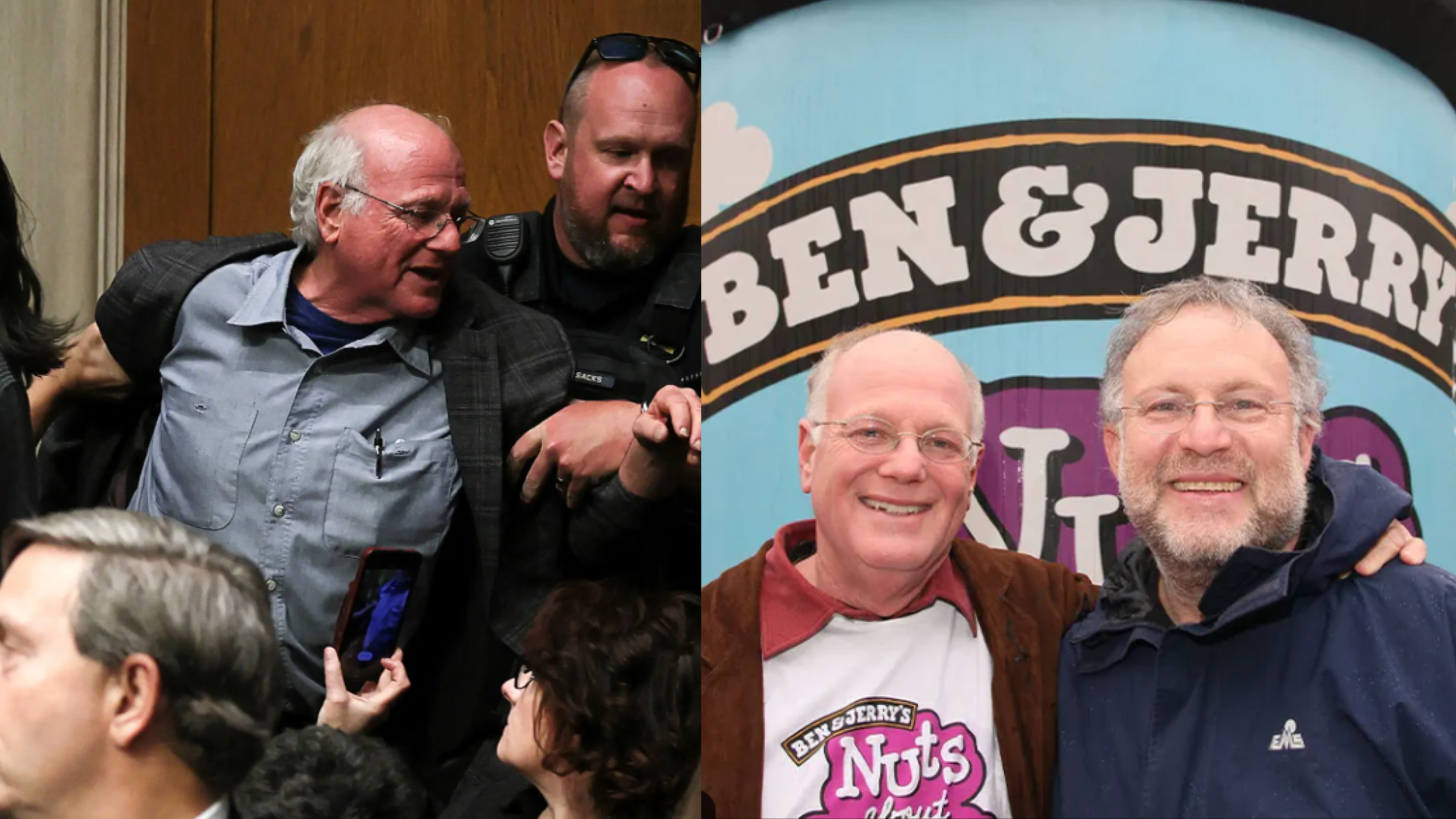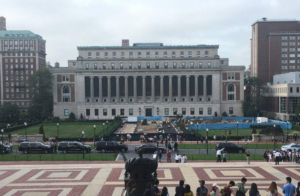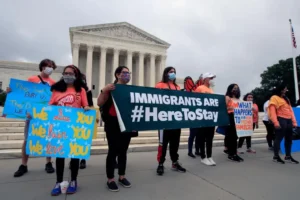Ben Cohen & Jerry’s Co-founder, arrested while protesting a Senate hearing, has stirred significant controversy across the USA, with many Americans closely following the unfolding events. This incident highlights deeper issues around political activism, free speech, and public dissent in America today. In this blog, you’ll find a thorough explanation of what happened, why it matters, and how it fits into the broader political and social landscape.
What Happened: Ben & Jerry’s Co-Founder Arrested at Senate Protest
The peaceful protest at the Senate hearing took a dramatic turn when Ben Cohen, the co-founder of Ben & Jerry’s, was arrested. The protest was sparked by inflammatory remarks made during the hearing, including the statement “RFK kills people with hate,” which shocked many and fueled heated reactions. This arrest has raised questions about the limits of protest, freedom of speech, and how public figures influence political discourse.
Why the Statement ‘RFK Kills People With Hate’ Sparked Nationwide Outrage
The statement attributed to the protest is highly provocative, referencing Robert F. Kennedy Jr. (RFK Jr.), a prominent and controversial figure. The phrase was seen by many as a direct attack on RFK Jr.’s political stance and character. Supporters of RFK Jr. felt the statement was defamatory, while critics viewed it as a necessary expression of dissent.
- Impact on Public Perception: The statement intensified political polarization, with social media exploding in debates.
- Legal and Ethical Questions: Was the protest protected free speech, or did it cross into hate speech territory?
The Role of Activism and Public Figures in Political Protests
Ben Cohen’s involvement in the protest sheds light on how celebrities and business leaders are increasingly using their platforms to influence political conversations. His arrest symbolizes a broader trend of high-profile activism shaping public policy debates.
| Aspect | Traditional Protestors | Celebrity/Business Leader Activism |
|---|---|---|
| Public Influence | Limited, local or community-based | Nationwide, global media coverage |
| Media Attention | Limited, local, or community-based | High due to fame |
| Impact on Policy | Variable | Often significant |
| Legal Risks | Standard protest risks | Increased due to visibility |
What This Means for Free Speech and Political Dissent in the USA
The arrest of Ben & Jerry’s co-founder during a Senate hearing protest shines a bright spotlight on the ongoing tension between free speech rights and governmental authority in the United States. As a country that prides itself on upholding the First Amendment, the incident raises important questions about where the line is drawn between peaceful protest and disruption of official proceedings. Many Americans see this arrest as a test case for how political dissent is tolerated, especially when it challenges powerful figures or institutions. It reminds us that exercising free speech in politically charged environments can still come with serious consequences, even for prominent public figures.
Moreover, this event underscores the growing divide in America’s political landscape, where passionate activism often clashes with formal governance. For activists and citizens alike, it serves as both a warning and a call to action — emphasizing the importance of standing up for one’s beliefs while navigating the boundaries set by law enforcement and political frameworks. Ultimately, it reflects the delicate balance America must maintain to protect democratic freedoms while ensuring public order, a challenge that will likely shape future debates on civil liberties and protest rights nationwide.
How This Controversy Reflects Broader Political Divisions in the United States
The controversy surrounding the arrest of Ben & Jerry’s co-founder during the Senate hearing is a clear reflection of the deep political polarization currently gripping the United States. On one side, some view the protest as a legitimate form of political expression and a necessary challenge to the establishment, especially amid rising frustrations with government transparency and accountability. On the other hand, critics argue that such disruptive actions undermine democratic institutions and contribute to an environment of hostility and division. This event exposes how divided Americans have become over what constitutes acceptable political behavior and how dissent should be expressed.
Moreover, the charged language involved, such as the explosive statement “RFK kills people with hate,”—further highlights how personal and intense political debates have become. Such rhetoric often fuels emotional responses and hardens partisan lines, making it harder for Americans to find common ground. The incident is emblematic of broader societal tensions where political disagreements spill beyond policy into personal accusations and public confrontation. Understanding this helps contextualize why protests like these evoke such strong and divided reactions nationwide.
Key Players and Their Roles in the Protest Incident
| Person / Group | Role | Public Perception | Possible Motivations |
|---|---|---|---|
| Ben Cohen | Protester and Ben & Jerry’s co-founder | Seen as an activist or agitator | Defend free speech, political stance |
| Senate Committee | Subject of protest | Authority figure | Conduct a hearing, maintain order |
| RFK Jr. | Target of the controversial statement | Politically divisive figure | Advocate political agenda |
| Media | Coverage amplifiers | Varying bias | Inform the public, attract views |
Key Facts and Context Behind the Ben Cohen Protest and RFK Jr. Controversy
On May 14, 2025, Ben Cohen, co-founder of Ben & Jerry’s, was arrested during a Senate hearing where Health Secretary Robert F. Kennedy Jr. was testifying. Cohen disrupted the session by shouting, “RFK kills people with hate,” a statement that quickly went viral and intensified national debates. The protest was part of a broader movement criticizing the Trump administration’s policies, particularly those related to the Gaza conflict and health department budget cuts.
Robert F. Kennedy Jr., who has a history of controversial statements, has faced criticism for remarks suggesting that COVID-19 was “ethnically targeted” to spare certain populations. These comments were widely condemned by Jewish organizations, including the Anti-Defamation League, and led to public denouncements from his family members. Despite the backlash, Kennedy has defended his right to free speech, stating that the First Amendment was designed for speech that is unpopular or controversial.
The incident has sparked a wider conversation about the limits of free speech and the role of public figures in shaping political discourse. While some view Cohen’s protest as a necessary act of civil disobedience, others argue that it undermines the decorum of governmental proceedings. The event also highlights the increasing intersection of activism and politics, with individuals leveraging their platforms to influence policy discussions.
This controversy has further polarized public opinion, with supporters of Cohen praising his courage to speak out, while critics accuse him of disrespecting democratic institutions. The debate underscores the challenges in balancing the right to protest with the need for civil discourse in a democratic society.
As the situation develops, it remains to be seen how it will impact future political protests and the boundaries of acceptable speech in public forums. What is clear is that this incident has become a focal point for ongoing discussions about free speech, political activism, and the responsibilities of public figures in the United States.
Final Thoughts
The arrest of Ben & Jerry’s co-founder at the Senate hearing protest is not just a news story — it’s a reflection of the complex and often volatile state of political discourse in America. Understanding the facts, implications, and underlying issues can help readers form informed opinions and engage constructively.
For ongoing coverage and deeper analysis of similar political and social issues, subscribe to trusted news sources like USnewsSphere.com, a platform known for its reliable, timely, and balanced reporting.
Subscribe to trusted news sites like USnewsSphere.com to stay informed with verified, up-to-date news impacting the USA and beyond.
[USnewsSphere.com / usn]





